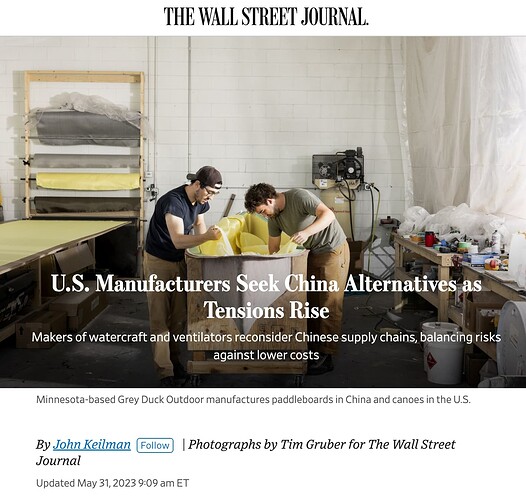-
对军事冲突的担忧和日益增长的安全忧虑,使美国制造商重新评估对中国的依赖。许多人正在策划替代的供应链,或者设计可以在其他地方生产的产品,以防中国无法进入,正如2014年对乌克兰的入侵,以及最近对总部设在波士顿的咨询公司贝恩公司的工人的质询和对明思集团北京办公室的突袭。
-
中国占全球制造业的31%,是许多美国公司的重要市场,使许多公司陷入困境。埃隆-马斯克和苹果公司首席执行官蒂姆-库克表示,尽管存在风险,美国和中国的商业利益仍然保持一致。总部位于匹兹堡的油漆和涂料公司PPG在中国有15家工厂和约4000名员工,对其在中国的知识产权和数据格外谨慎。
-
中国的法院系统对美国公司越来越不友好,导致一些公司考虑离开。然而,事实证明,要找到一个与他们在中国的设置相当的地方是很困难的,因为越南已经变得如此受欢迎,以至于现在很难找到制造空间。尽管目前的政治气候,Baysource Global的大卫-亚历山大指出,在中国,“工厂层面上仍然是照常营业”。
-
呼吸机公司CorVent Medical依靠中国工厂提供其产品的必要部件,但首席执行官Richard Walsh遇到了替代部件进入供应链的问题,与Covid有关的僵局导致成本飙升和运输延误。CorVent公司目前正在北达科他州的法戈市开设一家工厂,以组装通风设备,但由于大多数部件来自中国,因此需要数年时间才能转为国内来源。
-
重新定位倡议正在帮助CorVent公司组建一个新的供应链。该公司期待着比他们在中国得到的更高的价格和更慢的服务,但沃尔什认为医疗设备太重要了,不能与之隔绝。他认为,他们越快摆脱中国的零部件,每个人就越安全。
-
灰鸭子正试图通过在美国制造的新产品,如独木舟,来减少对中国的依赖。虽然在中国生产的便利性促使他们坚持在中国生产桨板,但老板对中国的监督做法越来越感到不安,并可能再次访问以了解工厂的健康状况。
-
Fears of military conflict and increasing security worries have caused U.S. manufacturers to re-evaluate their reliance on China. Many are plotting alternate supply chains or devising products that can be made elsewhere in case of an inaccessible China, as seen with the 2014 invasion of Ukraine and the recent questioning of workers at Boston-based consulting firm Bain & Co. and raid of the Beijing offices of Mintz Group.
-
China accounts for 31% of global manufacturing and is an important market for many U.S. companies, leaving many in a bind. Despite the risks, U.S. and Chinese business interests still remain aligned, according to Elon Musk and Apple CEO Tim Cook. PPG, a Pittsburgh-based paint and coatings company, has 15 factories and about 4,000 employees in China and is being extra cautious with its intellectual property and data within China.
-
China’s court system has become increasingly unfriendly to U.S. companies, leading some to consider departing. However, finding an easy equivalent to their setups in China is proving difficult, as Vietnam has become so popular that manufacturing space is now hard to find. Despite the current political climate, David Alexander of Baysource Global notes that “it’s still business as usual at the factory level” within China.
-
Ventilator company CorVent Medical relies on Chinese plants for the necessary components of their products, but CEO Richard Walsh has experienced problems with substitute parts entering the supply chain, and Covid-related logjams have caused spiraling costs and shipping delays. CorVent is now opening a factory in Fargo, N.D. to assemble ventilators, but with most components from China, it will take years to switch to domestic sources.
-
The Reshoring Initiative is helping CorVent to assemble a new supply chain. The company is expecting higher prices and slower service than they receive in China, but Walsh believes medical devices are too important to be cut off from. He believes the quicker they can get away from Chinese components, the safer everyone will be.
-
Grey Duck is trying to lessen its reliance on China with new products made in the U.S., such as canoes. Though the ease of manufacturing in China is prompting them to stick with the country for their paddleboard production, the owner has grown leery of the country’s surveillance practices and will likely visit again to get a feel for the factory’s health.
